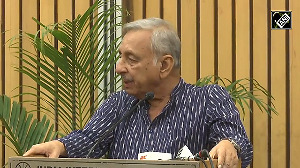Few doubt that the markets are safe in the long run given the economy's growth path, it is in the short term that there are some fears.
Nirmal Jain, CMD, India Infoline
Don't look at the absolute value of the stock indices, look at the valuations. At 18 times to FY07 earnings and 14 times to FY08 earnings, the markets look quite reasonable. They are just mirroring the India growth story.
Stock markets by nature are an adventure sport, and are therefore not for the weak hearted. For instance, those who play football, cannot afford to worry about getting hurt.
A bit of a fracture or a ligament tear cannot be termed "dangerous". Those who have such fears should never invest in stocks, but restrict themselves to government securities or bank deposits, or to stick to the analogy of sports, stick to games like carom or housie.
My view is that the stock markets are not in a danger zone. In other words, there is no apparent danger of a major crash or a bubble burst. The adjective "apparent" is to guard against any unforeseeable catastrophes.
This does not rule out some jitters and corrections that any healthy bull market needs. Stocks can always fall despite low valuations and rise despite excessive valuations in the short run.
In times like this, unscrupulous promoters taking naïve investors for a ride, is something that can always be expected, so don't rule out that possibility either. My conviction, however, is that for long-term investors taking bets on large and quality companies at current prices, there is hardly any possibility of a major capital loss.
The Indian stock market is at a high altitude and, therefore, this is the favourite debate topic for the media.
Rather than looking at the absolute level of stock indices, it makes more sense to look at valuations. Judging by the most popular benchmark of price to earnings multiple, Sensex stocks quote at around 18x FY07 and 14x FY08 earnings.
When you start digging in mid-cap stocks, you will find several quality companies quoting at single-digit multiple to their FY08 earnings. Even the most conservative analyst would say that while these multiples are slightly on the higher side, they cannot be described as obscenely high, or a bubble, a situation that is ripe for a huge crash. An optimist like me would argue that given the high growth, there is room for further appreciation.
The P/E multiples should be seen in the light of the growth potential and the relative risk with that potential. The Indian economy is growing at more than 8 per cent per annum.
Sceptics would say infrastructure bottlenecks would throttle further growth. I would turn around and say whatever we have achieved till now is with probably the most wretched infrastructure in the world. Therefore, with such large flow of investments, growth can only accelerate.
Most would have read the headlines a couple of days ago, which said that corporate tax collection for first nine months of the year were up by 41 per cent on a year-on-year basis. That shows the momentum of earnings growth. There are some news stories that are even more thrilling.
The employment growth has been 11-12 per cent per annum in financial and other services. It may sound impressive but that is not the climax of the story. Employment growth in the construction and mining sector has been 23 per cent year-on-year. So the base is solid as well.
If there are any sceptics on the India story, I suggest they travel through cities, towns and villages of India and witness the growth - be it roads, malls, air travel, multiplexes, houses or growing consumerism, we've never seen any growth like this.
Those who believe in the India story would look forward to stock markets mirroring economic growth. I have heard many danger stories scaring away small retail investors from participating in this growth. Alas, foreigners got it right and made tons of money. It is never too late. The one caveat remains that stocks are not meant for short-term investors.
C J George, MD, Geojit Financial Services
Despite the long-term prospects, the markets may react negatively in the short run as, in this time frame, other factors come into play as well. Technical weaknesses and a moderate outflow of funds can cause very sharp falls in stock prices.
The Indian stock market rewrote history when the benchmark Sensex crossed the 14,000 mark. Even at current valuations, the confidence level is strong with the market in a long-term bullish phase supported by excellent economic fundamentals.
Seasoned investors consider it prudent to go for very selective investments regardless of index levels. Considering the fast and sustained growth of the economy and rising corporate earnings, long-term equity investments will continue to bring good returns. However, the market may be volatile in the short term and caution should be the watchword for short-term players and day traders.
If one looks at stock market as the barometer of economy, there is nothing wrong in the rising equity values in India, as our economy is one of the fastest growing economies in the world.
For the first half of the current fiscal, Indian GDP had grown by over 9 per cent, thanks to excellent performance of the secondary and tertiary sectors. This spectacular growth is at a time when many economies in the developed world are struggling to post even a 3 per cent annual growth.
Lured by sound fundamentals of the Indian economy and superior gains from equity investments, foreign investments are consistently on the rise indicating that the bull market is likely to stay this way for a while.
Despite promising long-term prospects of the economy, the market may react negatively in the short run because the short-term market trends are closely related to many factors other than economic fundamentals as was evident on Tuesday.
Technical weakness and even moderate outflow of funds due to redemption pressure can cause disturbances in the marketplace leading to a sharp fall in stock prices. The impact of such temporary factors can be fierce when the market is hyperactive with speculative positions built up.
We have seen this in the sharp fall in last May, in which many equity traders had burned their fingers. What followed was a strong bounce in values that pushed the indices to newer heights and the long-term investors were generally left unscathed.
Though the overall economic scenario in India is optimistic, there have been concerns on the global front such as the fear of an economic slowdown in the US, inflationary pressures in the US, Europe and Japan, which can adversely affect foreign investments in the market.
If any of these concerns come true, this may lead to negative sentiments in the market place leading to a sharp fall in values and short-term players may be the hardest hit.
While looking at the prospects of the Indian market, fuller convertibility of the rupee, a strong securities market infrastructure, a strong regulator and so on, are positive factors. These can lead to sustained inflow of foreign capital so long as the economy is on growth track.
From the valuation front, it seems that a large number of good quality stocks remain undervalued even when the Sensex is at 13,000-14,000. This has been well indicated by the movements of mid-cap and small-cap indices in comparison to the bellwether indices like the Sensex.
For instance, the Sensex moved from the earlier top of 12,671 attained in May to 14,035 by November, after a sharp correction in last June. Compared to this, the mid-cap index is still ruling at nearly 4 per cent lower from the May high of 6,070. The small-cap index is cheaper and at 6,850 it stands at a discount of around 14 per cent to the May top of 7,872.
This points the Indian boom being a bit lopsided and concentrated on frontline large-cap stocks. In fact, many of these stocks are the blue chips of the future. Selective investment in such stocks with a long-term view will bring attractive returns even if the current euphoria is over.







 © 2025
© 2025